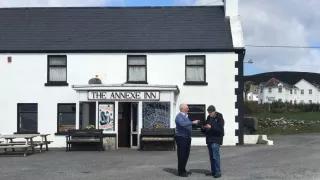Achill Island, the westernmost tip of Ireland, was a retreat and source of inspiration for Heinrich Böll. He immortalized it in his Irish Journal, and the local people thank him to this day with an annual Memorial Weekend. This event is an integral part of German-Irish relations, which will become even more important with Brexit – in the spirit of a European cultural policy.

In 2007, on the 100th birthday of Heinrich Böll, the poet Thomas Steinaecker professed that he is glad to live in Böll Country, the home of reasonable and open-minded people. At the time, he probably didn’t have Achill Island, the westernmost tip of Ireland, in mind. Yet perhaps the most enthusiastic inhabitants of Böll Country can be found right there – on this windswept island with its amazing inhabitants, which Heinrich Böll portrayed in the Irish Journal.
On this remote tip of Europe, there is a keen awareness that the next larger city to the west is New York, where for more than two centuries, the Statue of Liberty enticed thousands of people with the hope for a better life. They wanted to escape the famines and poverty that remained tangible on the island into the 1950s.
In the mid-1950s, Böll was drawn to Ireland by his love of the countryside and Irish literature. His work is still alive on Achill Island today. What he could not have known at the time was that his Irish Journal would become a portrait of a unique world on the cusp of disappearing. The modern industrial society that arose in the 1970s and the Irish economic miracle since the 1990s has transformed living conditions, even in remote parts of the land. Emigration continues to this day, but now the Irish have alternatives – no one is forced to leave the country. Since the eastward enlargement in 2004, many EU citizens from central and eastern Europe have chosen to immigrate to Ireland.
Achill Island, currently inhabited by no more than 2,500 people, has become a haven for artists, from Graham Greene to the painter Camille Souter – and the traces of Heinrich Böll’s work become apparent time and again. It was precisely because Achill Island was his refuge that he opened himself up to the people, the weather and the life of the islanders. His memory remains very much alive – to the point of a landlord coming running out of his inn in the middle of a morning to stop Böll’s son in the street. What he has always wanted to ask: is that gentleman with the cigarette in the old family photo Heinrich Böll? René Böll looks at the picture and tells him, unfortunately not. But he had been at the inn – there is no doubt about that.
Thus, the Irish Journal is more than the story of a remote country. It is a memory space and a key to the Irish mentality and culture for continental Europeans. It is in this spirit that the Achill Heinrich Böll Association, with its highly committed volunteers and modest financial resources, puts on its annual Memorial Weekend – a firm tradition for nearly 15 years now. The fact that the German ambassador attends personally – traveling almost four hours from Dublin to speak warm opening words – may seem self-evident in a small country, but it underscores how significant this unpretentious commemoration is for German-Irish relations.
The boost that these relations have experienced – with unusually numerous visits by high-ranking German government representatives in recent months – has been prompted by Brexit, which the Irish perceive as a mess. But if Brexit does happen, it will strengthen Ireland’s role in the EU and increase demand for German-Irish dialog formats – one of which is the Heinrich Böll Memorial Weekend.
With its modest online presence, it has thus far remained a treat for those in the know: a good mix of lectures, workshops by the German-Irish scientific community, readings by authors, concerts, archaeological hikes over brownish-green hills with breathtaking views over the emerald-green Atlantic – and an open house at the Heinrich Böll Cottage. The small, well-kept property, hidden behind the fuchsia hedges described in the Journal, is the heart of the association’s work. Its preservation requires some effort, and it benefits the artists who come here to seek inspiration and tranquility for two weeks at a time.
A small, local association has realized something here that cost millions to achieve in Los Angeles – it opened the house of a German Nobel Prize winner to grant recipients in support of their artistic work. The two-week residency is virtually an insider tip, yet the number of applications exceeds the possible openings by a factor of five. What makes the Böll Cottage residency special is its connection to activities in the local community – as lived by Böll himself: exhibitions, readings or projects with the students of the local college are a part of it.
The Heinrich Böll Memorial Weekends end on a Sunday. What must not come to an end, however, is German interest in a long-standing, deeply rooted European project founded by the Nobel laureate in literature. The Heinrich Böll Cottage is an integral part of German-Irish relations, which will gain in importance with Britain’s withdrawal from the EU. With regard to European cultural policy, this project, which is well-anchored at the grassroots level, deserves more attention from the German side.